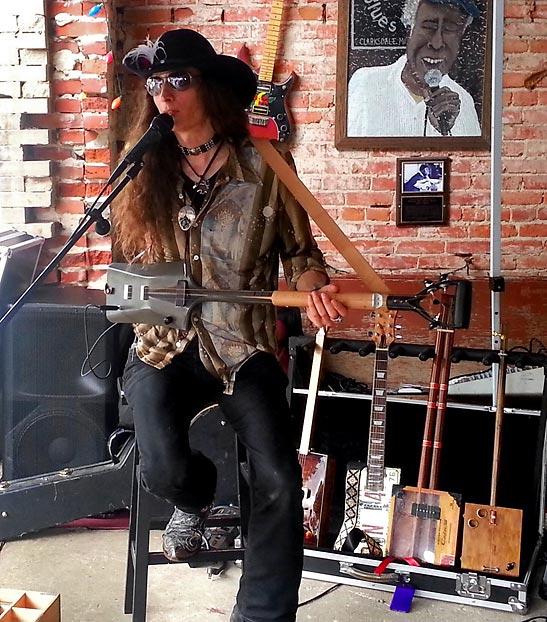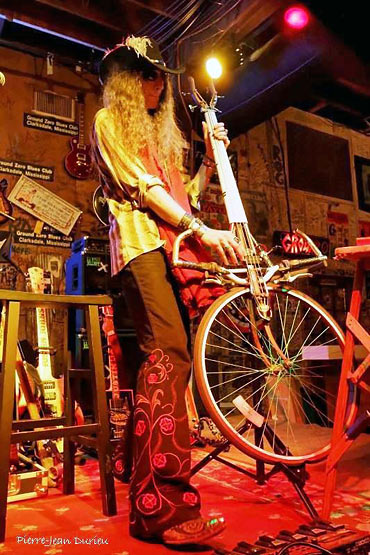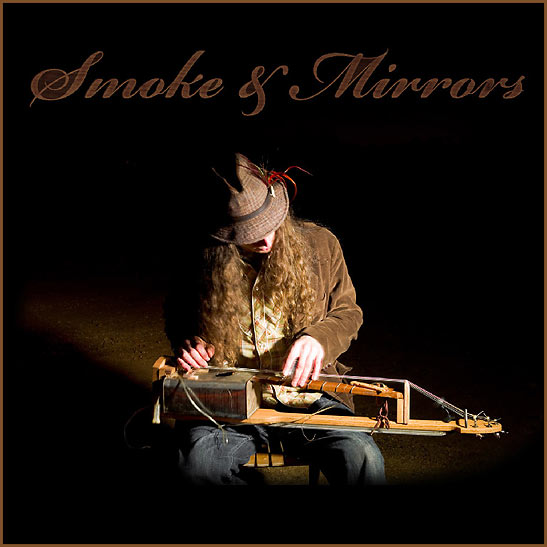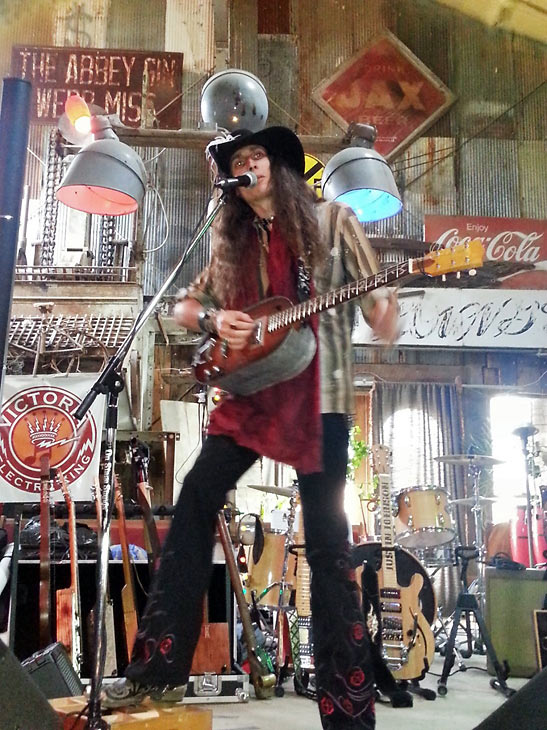 |
 |
|
 |

|
Justin
Johnson
After running into Johnson again at a place called Red's, where we witnessed the incomparable Robert 'Bilbo' Walker torch the place, it was decided to get together and talk the next morning at the Hopson Plantation. Our conversation would encompass the uniqueness of Justin's music, his instruments, and the direction his road has taken. We started with Johnson's own roots. "My family has always been musical and artistic in different ways." Johnson explains. "My father was a great visual artist and my brother picked that up, I think. My mom and my grandpa, music has always been a big part of their life. My grandpa taught high school band and played trumpet his whole life. He was in World War II and was in the Army band playing trumpet. My mom's always been a DJ, too, which was great for me when I started getting really interested in music and guitar. There was always hundreds and hundreds of CD's and records." * * * * * * * * * * * * * * * "It's not like you can go
out and take blues lessons; you have to find people, * * * * * * * * * * * * * * * "I guess what I'm saying is that it's always been supportive, I think in some families you want to get into music and it's like, 'don't do that!' you know? But that was never the case. And there was always random instruments lying around, played a little piano, played a little trumpet, baritone horns, anything. I don't do it as much now; when I finally picked up the guitar… it was just waiting for me. It felt like, you know what I mean? That moment when you know something's going to change your life. I remember the first stringed instrument I ever played was this old Stella, no one knows where it came from and I still have it. It was old and kind of crooked, the intonation was shot in it and it only had one string on it. But I remember the first song I ever played was 'Louie, Louie,' (laughing) on the one-string Stella. It's funny because it was sort of like one of those full circle moments because now a lot of what I teach is the one-string diddley bow and talk about how much you can learn from one string. So when I think back on playing and picking out melodies on that old Stella it's one of those full-circle kind of things."
Johnson's road has now taken him from that one-string Stella to an assortment of farm implements, cigar boxes, tubs, bicycle tires, ironing boards and about everything imaginable you can tighten strings across. "Well, there are a couple of things about that that I love," he grins. "And one is that everything sounds different. You never know what something is going to sound like. Visually it looks like, 'oh that's cool, because you made that out of a shovel.' Or someone made a guitar out of a washtub, but from the artistic point of view, from the musical, the tone, the tambour of these instruments is very unique. And the feel of them too, in your hands inspire something totally different. And plus, like the shovel guitar there are certain challenges that come into play. When you're playing a shovel, a three-string shovel as opposed to a really nice, six-string guitar that almost plays itself, what it does is… not only does the challenge make you better but it also… certain things are limited, but other things are brought out of your playing. You have to use a slide with the three-string shovel guitar, and the actions super high. And you get this different play in it, so it inspires a totally different thing. You can push in harder, you can dig in more like a lap-steel, but in your hands, you know?" It's definitely an attention-getter. Johnson also uses these unique instruments when he participates in the Blues for Schools program. "Everyone, no matter what age they are seems like they're interested in a different element of this art form. Some people just like the engineering side of it or the guitar-building side of it. Some people really love the musical side of it. And I think kids have this sort of really pure and enthusiastic perspective on it. It's just like fun and different and cool, they're not thinking about all the different elements at once, it's just something fun to do and something interesting. It's a cool guitar to play, especially the three-strings, the one-string they're a lot easier and more accessible for beginners and kids so you can pick it up and start strumming and you're having fun before you know it. You don't have to learn the chords and fingerings right off the bat before you can have fun playing it." I heard you recently worked with kids at the Sunset Middle School in Coos Bay, Oregon. You and the head of the guitar program, Nick Krissie taught about 130 fifth graders how to build and play their own 4-string cigar box guitars. What motivated you to do that? "I think so many musicians," Justin says. "Myself included, get into this culture and then realize how important it is. For me the educational work I do with schools and charities, so much of it stems from a desire to keep this going, to keep people informed about it. When I wanted to study music, you have jazz and you have classical. It's not like you can go out and take blues lessons; you have to find people, you have to learn it on the road and you have to learn it from performing. You have to put yourself in these situations, come down to Clarksdale and watch people… a real pure and a folk kinda' way of learning."
Can you describe the music you play? "I always talk about blues and any chance that I get when I talk to another blues musician, I'd say, 'what do you consider blues? What do you think about? What are you feeling when you're playing blues music?' 'Cause it's different for everybody. But it all has to do with what you're feeling, if you're feeling good or you're feeling bad or if you're feeling whatever it is… angry? And letting that come out through the music. Then it's genuine, you know? You have some genuine emotion coming out. When I play, every show is different and I do that partially on purpose because I want people who come to multiple shows to see something different every time. But it's also because I feel different every time I walk on stage and I'm always trying to convey something that's specific to the way I'm feeling and the room that I'm in and the people that are in that room. Some shows I'll do more jazz, some shows I'll do just blues… down here in Clarksdale, you know? I just wanna' play some blues the whole time, you know what I mean? If I'm in Memphis it might be a little bit different kind of blues… or St. Louis or Chicago I might be feeling that big city vibe and it might come out different than when I'm down here on the delta. But that's part of the fun, you're inspired by the place, you're inspired by the room but it all revolves around… I call it 'roots' music for lack of a better word. Because with jazz, I love that old Dixieland jazz, you know? With blues, I love that old Delta blues or that early electric blues. I'm always tracing something back to its source and I find that that's the place to really get the inspiration." You listen to people like Clapton, if I want to play like Clapton I'll listen to B.B. King or Albert King… the people that inspired Clapton. If I want to play like Hendrix, I'll listen to Buddy Guy, I'm gonna' listen to Lightnin' Hopkins and all of these people that inspired him. Then you understand the roots of it, you're not looking at the branches or the leaves you're tapping that same source." Have you had a chance to play with anyone that you really admired? "The most fun I've had playing with someone in a while was actually a couple of days ago," Johnson says. "I got the chance to play with Super Chikan (James Johnson) right here where we're sitting. He's been all over the world and talk about shovel guitars… I think we did the first shovel duet. I don't play with too many people who I feel I have a lot of stylistic similarities with but watching him the way his right hand strums the rhythm, he plays all these different homemade instruments and he's very good at using three-strings, four-strings, the one-string diddley bow, and I've never played with anyone who has the same experience in a lot of ways, as I do playing those instruments. We'd be playing two three-strings or a three-string and a one-string and it's very natural, we're both thinking the same language. I've never played with someone where I felt like we were both speaking the same foreign language, you know?" (laughing)
Tell me a little about your CD, Smoke and Mirrors. "Smoke and Mirrors is the culmination of a couple of years on the road, really digging into the tradition of homemade roots instruments. Not just cigar box guitars but just home-made instruments out of found objects and there's a long tradition of it. And there's also a modern tradition that's being continued now which is using all this new technology like electric guitar pickups, all these electronics, different materials. When people say, 'I love the tradition, but I'm gonna' break the rules.' It started out with the concept I'm gonna' do an all cigar box guitar, all roots instruments album, showcasing these modern builders I've met from all over the world, Europe, Australia, North America and then Nikki, my partner, the love of my life, muse, manager… everything, had the idea when we were on our way to New Orleans, driving down Highway 10. So we thought what if we can tap into the tradition as well and make it a double disc album called, Smoke and Mirrors? Smoke being the reference to the cigars and cigar box guitars, and mirrors being a sort of the reflections on the past? So I called up a guy, Bill Jehle who I'd actually never met and I called him up and said, 'Hey Bill, this is Justin Johnson, I don't know if you've heard of me but I've heard of your museum and I'd love to see if I can borrow all of your cultural artifacts, you know you're one-of-a-kind, irreplaceable artifacts, string 'em up and record them on an album. He was like, 'Yeah man, I've been wanting to work with you.' He was all enthusiastic about it, it was great and we have a great friendship that all started with that conversation. He let me use any instrument I wanted from his museum. We picked eight or nine of his instruments that were still in good enough condition to string up. We wanted to infuse as much history as possible, so we recorded the electric album at Sun Studio, the birthplace of Rock and Roll. Recorded the pre-WWII album here in the 'Shack Up Inn' at these pre-WWII share cropper shacks and also at the crossroads at midnight on New Year's Eve and just trying to get as much magic as we could capture on those recordings."
You and Nikki literally live on the road… in a van; down by the river… any defining moments on your journey so far? "Nikki and I have been living on the road now for three years straight. We don't have a home base and it's a tough decision to make. We decided the only way to find out how deep the pool is, is to dive in… headfirst! So we decided to cut the wires on the safety net, sold everything we own except for what we could fit into this little 23 foot box we live in. We're in North Carolina and I've got a radio show called, the Blue Plate Special the next day in Knoxville, Tennessee. And all of our batteries die. We have a friend in North Carolina who's an electrician and we go to him, alternator's dead. We finally get ready to leave at 11 o'clock at night for Knoxville, which is about 12 hours away, over the mountains. We race off over the Appalachian Mountains and into the worst rainstorm I've ever driven in, in my life, on the twistiest part of the mountains, getting passed by these truckers who are irritated by how slow I'm going. I'd never driven a camper before; an SUV is the biggest thing I've driven. Not only is it leaking, it's leaking from the front, a solid stream of water is coming from the front, it's leaking from the back and from the ground, there's a big hole in the wheel-well that's kicking water up in the bathroom, the whole inside is soaked and we finally get past the mountains right as the sun is coming up. About an hour out of Knoxville, the propane detector alarm goes off. So Nikki and I are soaking wet, we're frustrated and we've been up for about 30 hours, it's raining, we both have our heads down with the windows open trying to get fresh air thinking we're about to die from propane inhalation. And we're both just apologizing to each other. We finally make it to the radio station, totally panicked and out of breath. We do the radio show and find the propane scare was just a battery going dead and we finally have this moment where it's like, 'this was our trial by fire moment.' Everything after that was beautiful, sunny weather, learned things one at a time, picked up things on the road, learned them the hard way. Those are the moments I can think back on and think, 'these are the things that keep people from doing it' and if you do dive in head first it might be fun, you know? It might be exactly what you needed but you never know until you take the chance. You might end up by making a huge mistake, but it's a huge mistake you have to make. Then look back on it and say, 'I'm glad I tried it.' Since you are always on the road, where can people track you? "You can find anything you want on my website justinjohnsonlive.com and I've also got a rootsmusicschool.com which is the platform for all the instructional work and a lot of the interviews, a lot of the Roots from the Road interviews also. You can go to rootsfromtheroad.com which is my online weekly show, a video show that's interactive and I interview a lot of the interesting characters that I meet along the way." What's on your horizon, the next leg of your journey? "I just want to continue to make my music, and by my music I don't just mean originals but I love doing covers, too. My own versions of anything I can get my hands on. I love saying this is my music, this is what I'm feeling, this is what I'm communicating, and continuing to share that message and the history and also the educational side of it. I love doing the workshops and opening people's worlds to this whole culture and this whole tradition and just taking it to the next level each time. I've got a few ideas; Nikki and I are bouncing around for the next album. We've had a few of those goose-bump moments and that is what we follow. Literally, if we get goose-bumps talking about it, then we know we're heading in the right direction." Related Articles: |
|
|
This site is designed and maintained by WYNK Marketing. Send all technical issues to: support@wynkmarketing.com

|




























